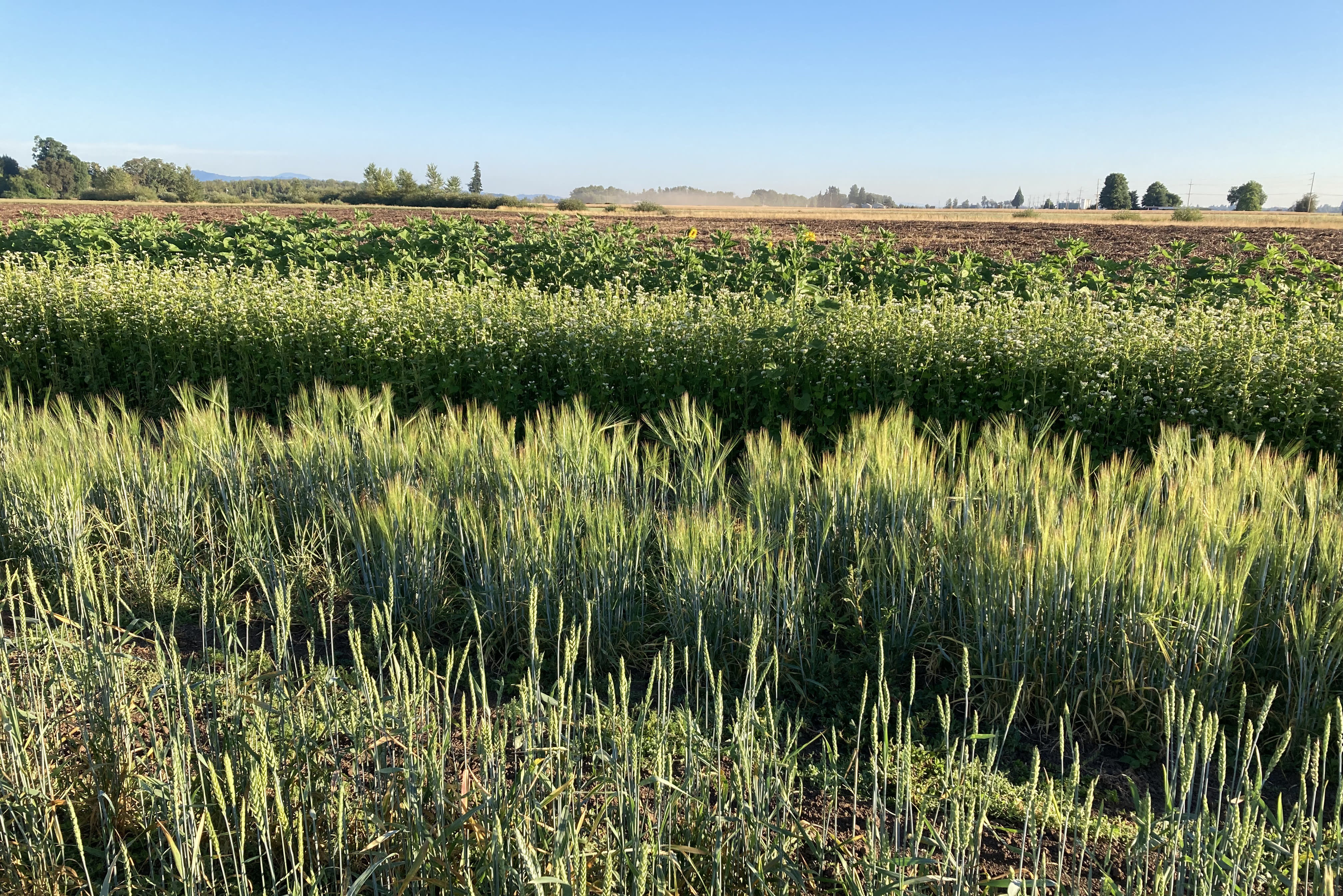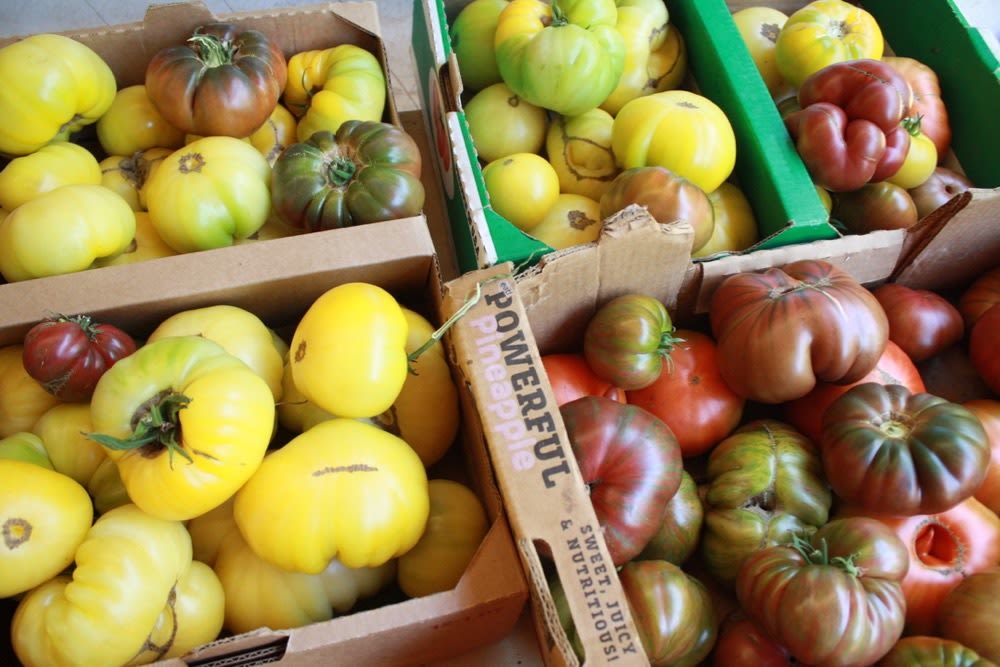
Sanctuary Farm Brings a Food Justice Focus to Produce
On a Sunday morning in July, Portland soul singer Blossom (AKA Keisha Chiddick) moves tables, shifts wooden pallets, lifts boxes, and arranges large light blue tubs as she leads a team of volunteers to organize and coordinate produce deliveries and distribution from a warehouse in inner Southeast Portland. Aside from Alex VanOutryve—the owner of Sanctuary Produce Farm, where all these fresh goods were grown—the warehouse crew comprises mostly women of color and non-cis men. For the day, there’s also me—a bi-racial Black girl who grew up in Oregon’s rural backyard with dreams of owning my own farm one day. The latest Khruangbin record blares through a Bluetooth speaker as the group of volunteers—many of whom were scouted by Blossom—dance, sing, and load bags with an array of fresh produce: large zucchini and yellow squash, bok choy, sweet onion, cucumber, butterhead lettuce, tomatoes, kale, kohlrabi, purple radishes, and collards, some precious pints of blueberries, and more. These gorgeous double-bagged sacks of produce feed some 100 people every week, through paid shares and donations, most of them members of the BIPOC community, and many of them receiving that food for free, or at reduced prices.
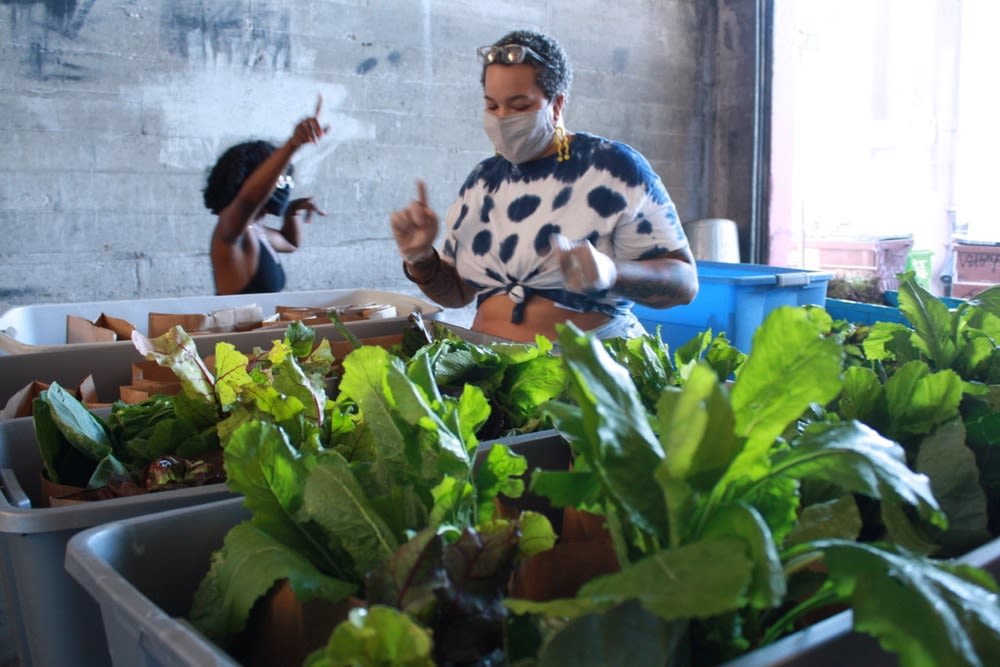
Blossom (background) and a volunteer with Sanctuary Farms preparing produce for delivery.
Image: Courtesy Jenni Moore
Even in states like Oregon, where there are plenty of public green spaces and parks, those who live in apartments, and in other more affordable housing, often have no access to private land use. One of the many systemic injustices that COVID-19 puts on display has to do with land sovereignty—the right of working peoples to have effective access to, use of, and control over land and the benefits of its use and occupation. It’s issues like this—along with Oregon’s history of redlining, other economic and systemic barriers to land ownership, food justice, and the knowledge that he’s farming on stolen land—that inspires VanOutryve to keep working to help Sanctuary live up to its name, and become a stable, sustainable safe space and a source of healing for Black and brown communities.
VanOutryve, who is white, says his dream for Sanctuary has evolved and expanded over the last eight years: from a humble homestead to help his family get by to a socially focused community hub where Black and brown people can reclaim access to land use.
“[The kids’ mom] kinda opened both of our minds to food injustice and to the whole factory farming system, and just how unsustainable that is, and the effects it has on individual health as well as the greater health of the planet and our community,” VanOutryve explains. “A lot of it though, was a little bit of a romanticized vision of living off the land, of homesteading.”
When I arrive at the 42-acre property in Dallas, Oregon, which includes eight acres of pasture farmland, VanOutryve greets me with a smile. He points to a tiny bare bones cabin next to the pasture where he and his family attempted to live off the land, which meant cooking over an open fire, washing clothes by hand, and his third child being born by candlelight.
After investing in things like irrigation and hoop houses—simple greenhouse-like structures over bare ground that don’t have the elaborate climate control systems of green houses—and working the soil with as little machinery as possible to grow his organic produce, VanOutryve was feeling unfulfilled by the routine of selling his yields at farmers market prices to a mostly white, upper class clientele. He took some time off to do a bit of soul searching. During his farming hiatus, VanOutryve became inspired by a trio of performances from artist-activist spoken word duo Climbing PoeTree, who deliver earthly themes with a hip-hop flair and focus on social justice. After the show VanOutryve connected with local singer Tonya Abernathy, who was singing back-up with the group. “She ended up being a 'farmer fangirl', in her words,” VanOutreyve tells me from his porch as we watch a hawk search the fields for prey. “[She has] been a guiding light for me, just pushing me forward.”
He started to imagine a people’s market serving the Black and brown community. But as COVID hit, he leaned into the existing CSA model, where members pay for shares in the farm’s yield. “I shifted towards the delivery model, trying to support the community in that way, through the stay at home order,” he says. “There are quite a few people in our community who do have underlying health conditions, and that do want to just limit their exposure, limit how much they go to the store, so it’s been positive in that way.”
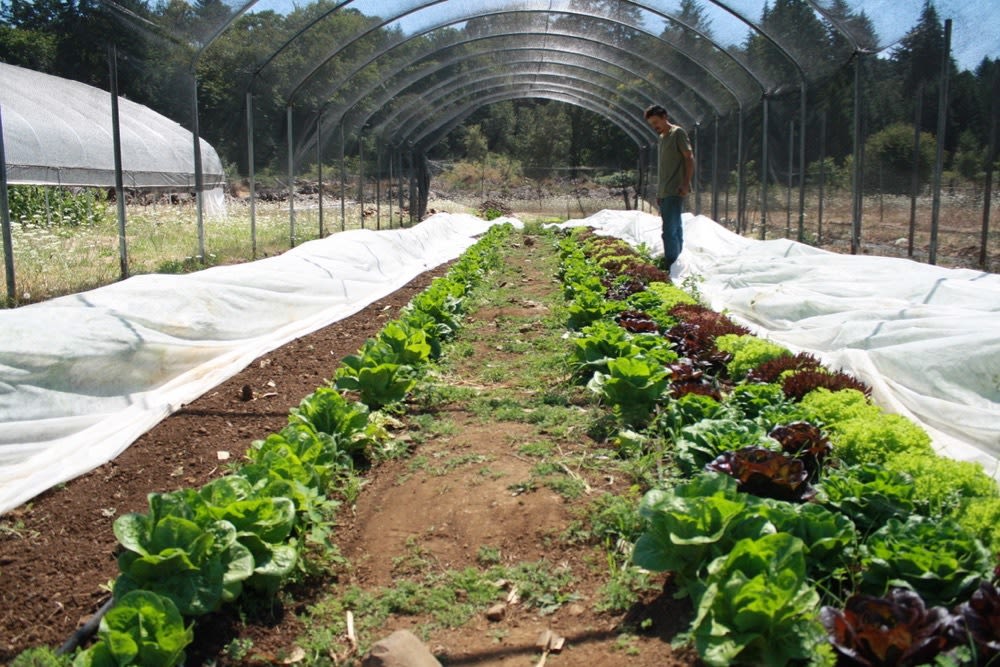
VanOutryve at the farm.
Image: Courtesy Jenni Moore
Blossom met VanOutryve, who was already a fan, at a Doug Fir show last February—she approached him to see if he had weed after a request from the show’s headliner, Sudan Archives—and found out about his CSA’s mission, which aligned with her own passions for food justice.
VanOutryve says he typically has trouble asking for help, but “[Blossom] kinda just kept showing up.” Ultimately, the singer joined Sanctuary’s co-operations manager Andrea Celeste as a co-owner of the CSA, assisting with Sanctuary’s community outreach, communications, and deliveries since the beginning of April. Together, they are looking to figure out how this project, currently set up as an LLC but with the goal of becoming a nonprofit, will evolve.
“I didn't ever feel like he necessarily needed my help,” Blossom explains. “It was more so like, I know how this is gonna get to the people that it actually needs to get to. The word wasn't being spread enough to the people that it really needed to get to in the time of the pandemic.”
It’s no secret amongst Blossom fans that plant life has always been a part of her creative aesthetic. The singer, who has roots in Trinidad and Tobago, says that before getting involved with Sanctuary, nurturing houseplants—and lots of them—was pretty much the extent of her adult experience with agriculture. But she tells me she’s also been shaped by the childhood memories and conversations she had in gardens, making her floral-themed moniker seem all the more appropriate.
“My aunt who I lived with for a while when I was in high school has the most amazing garden I've ever seen,” Blossom says. “I grew up a lot in the garden.”
In her new role at Sanctuary, she says she’s learned that everything is unpredictable and sustainability is all about being able to adapt. “Sometimes the weather may not permit it,” she says. “Sometimes things don’t grow the way you want them to. Sometimes a plan that you thought of doesn't go the right way. And a part of the process is building blocks and building branches—that when one part goes south, you have another branch to hold onto, grow and cultivate from.”
In addition to music and farming, Blossom has also been involved in organizational meetings for local Black Lives Matter demonstrations, and plays a curatorial role at Tropical Salvage store on Fremont. She says Sanctuary’s mission has a particular overlap with the music community, “for our mental health”—local musicians can often be found volunteering on the farm, and drumming up support for the project. (On the day of my farm visit, local jazz pianist Charlie Brown is carefully harvesting tomatoes.) Musicians, adds Blossom, are always looking for inspiration. “I know I've been really inspired [by being at the farm] and I felt really connected. And like a real person.”
Blossom is also helping with Braiding Roots, a BIPOC-led collaboration sharing food, plant, and healing arts created by Celeste. In the near future, this extension of Sanctuary will give customers an opportunity to come to their walk-up apothecary and food pantry located at their SE warehouse, where they can also pick up produce orders.
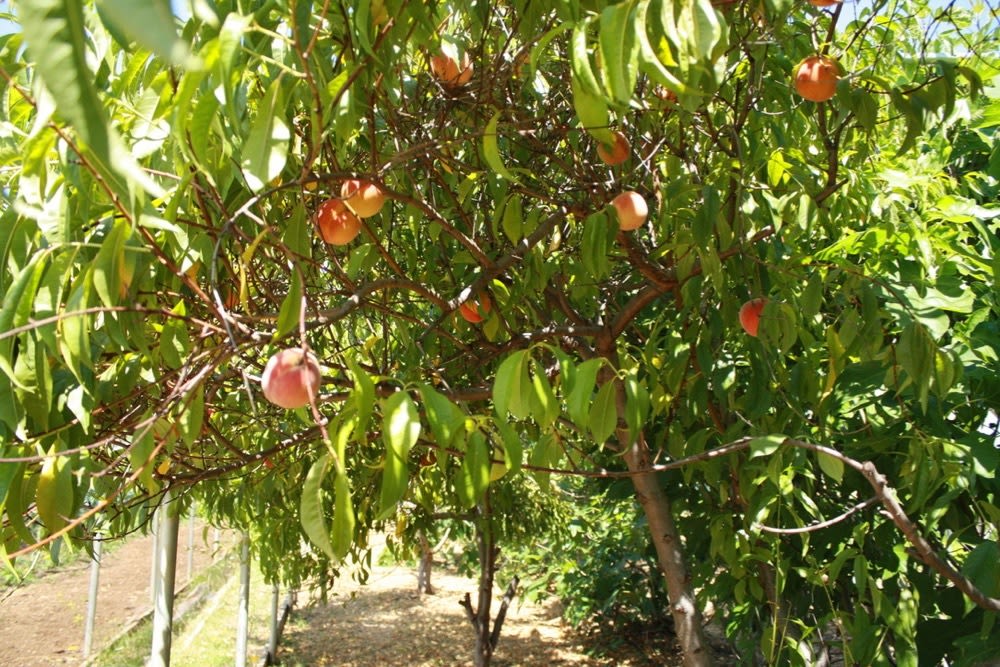
Image: Courtesy Jenni Moore
VanOutryve says he still struggles to know whether he’s using his privilege in the right way. “I’d like to be focusing on those broader goals and the broader development of the land and bringing the community in and empowering those different projects, and really letting Black and brown farmers take over the land.” He also plans on passing down the land as a legacy to his three Black children.
For now, like many CSAs, Sanctuary Produce Farms still has to rely on volunteer labor—both in the Portland warehouse, where I joined the volunteers, and on the farm itself. But those who give their time get to take home the fruits of their labor, paid in produce until the end of the season.
With the pandemic, VanOutryve has had to put his dream of hosting private community markets and cultural gatherings on pause. “Really even as soon as next year is what we’re hoping to push towards for making this land more accessible,” he says. “Building the infrastructure to support gatherings, to support workshops, to really lay that infrastructure and that foundation to be able to empower the community. To give them the places and the resources to hold events, hold educational workshops, just have little retreats. Whatever is calling different community members, giving them the support to empower them and make that happen.”
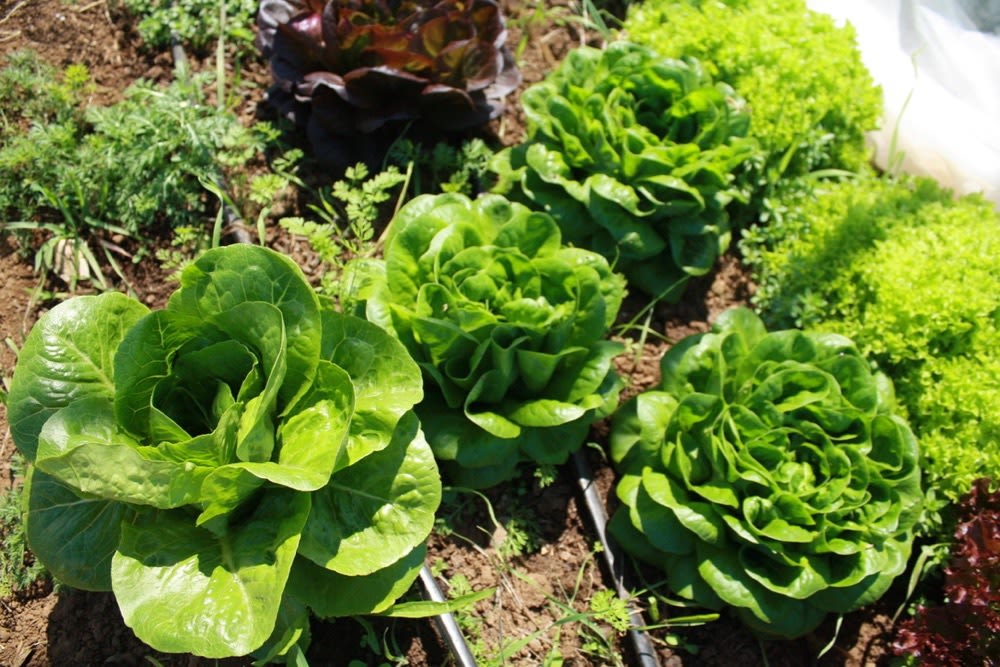
Image: Courtesy Jenni Moore
It’s hard to not see myself reflected in the wholesome photos of VanOutryve’s kids in the garden, posted on Sanctuary’s Instagram page for inspiration. An image of his eldest curly-haired daughter sitting in a peach tree kicks up fond memories of stationing myself in my great aunt’s fruit trees in Eastern Oregon, and just being content to sit there and eat stone fruit all day. Even though I have often resented the fact that Oregon culture hasn’t always been my jam, and sometimes it feels impossible for me to fit in, I have always found an inimitable feeling of home in this region’s seasonal bounty.
Investigating socially focused agriculture projects like Sanctuary gives me a chance to learn from established farmers before pursuing my own aspirations of land and farm ownership. Visiting the Sanctuary property felt like an invitation to come back to myself, reconnect with the Earth, my community, and do something as intuitive and satisfying as enjoying the fruits of my labor. It’s an invitation that’s hard to pass on, considering the peaches VanOutryve sends me home with, which felt so ripe and bruisable through their fuzzy, sun-ripened exteriors, ultimately forcing me to devour them every following day over my sink or with two paper towels should their sweet juice run down my arm.
Meanwhile, there’s work to be done: food to harvest, pallets to move, boxes to be delivered.



